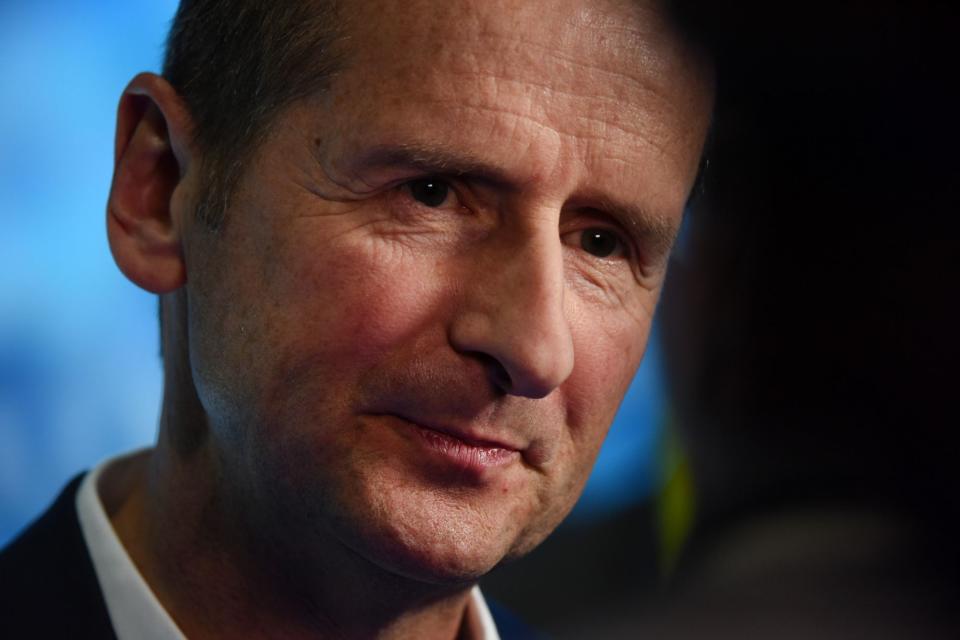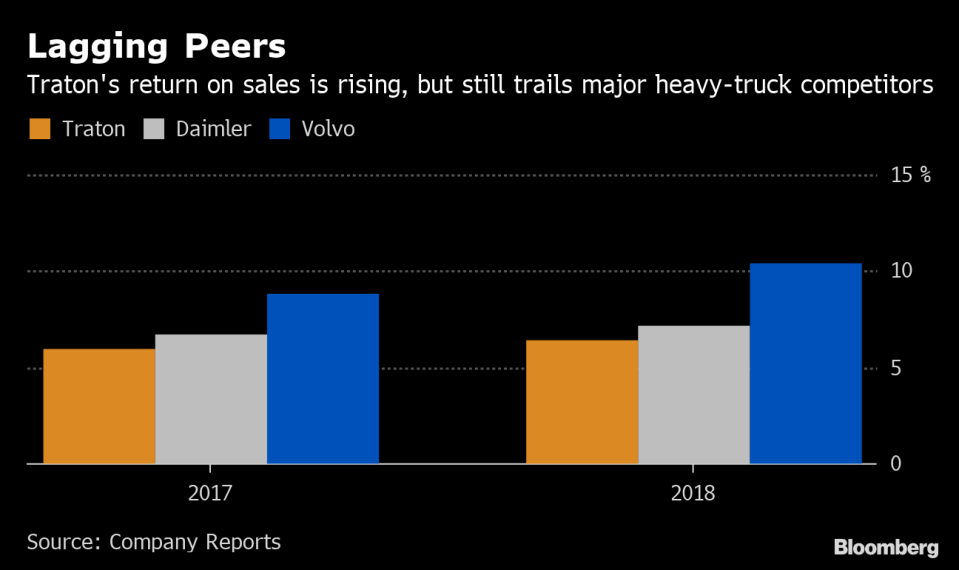VW's $2 Billion Truck IPO Reflects Push to Trim the Empire
(Bloomberg) -- Want the lowdown on European markets? In your inbox before the open, every day. Sign up here.
Volkswagen AG’s plan to list its truck division later this month will test whether it can pull off a feat that was once unthinkable for the German automotive giant: get smaller.
For decades, the world’s biggest carmaker only knew how to expand -- adding Bentley luxury cruisers, Ducati racing bikes and Scania heavy trucks while taking its network of factories well past the 100 mark and its headcount over 640,000.
Even in the face of the debilitating diesel-cheating scandal in 2015, the manufacturer didn’t trim its portfolio, bolstering investment in electric cars instead and even creating a new division for mobility services.
Now with the pace of change in the auto industry quickening, Volkswagen is trying its hand at trimming the empire.
If the listing of a minority stake in Traton SE -- a truck and bus maker with three vehicle brands and valued at as much as 16.5 billion euros ($18.5 billion)-- goes well, it would give Chief Executive Officer Herbert Diess more sway to balance the often diverging interests of VW shareholders including the Porsche and Piech owner family, Lower Saxony and powerful labor unions.
Healthy Valuation
“Traton’s IPO pricing suggests a healthy valuation which puts a spotlight on VW’s significant sum-of-its-parts disconnect,” RBC Capital Markets analyst Tom Narayan said in a note. Concerns over the company’s ability to switch to electric vehicles is “unfairly” weighing on its share price, the analyst said.
Volkswagen rose 0.2% to 141.42 euros at 11:46 a.m. in Frankfurt trading, taking gains this year to 1.8%.
For now, Diess is seeking deeper technology partnerships and the possible sale of assets like transmission maker Renk AG and MAN Energy Solutions, which develops engines. A successful Traton listing, targeted for June 28, could even spark rival Daimler AG to follow suit with a carve-out of its own truck business.
The truck group comprises three main assets, Scania, MAN and Volkswagen-branded budget trucks sold in South America and Africa, as well as a unit offering digital services to fleet operators. With 29 production and assembly sites globally, the business last year sold 223,000 vehicles. While that’s 14% more than a year earlier, it’s less than half of Daimler’s truck division, the world’s biggest.
Volkswagen is offering 50 million Traton shares at 27 euros to 33 euros apiece, plus a possible over-allotment of 7.5 million shares, meaning at the top end of the price range, the sale would raise as much as 1.9 billion euros. Here are the key points in one of the biggest initial public offerings in Europe this year:
Sales Pitch
Traton is looking to woo investors by combining the best-in-class technology and strong margins of the Scania unit with the prospect of a turnaround at MAN and growth potential in key markets, according to company presentations and research from advising banks seen by Bloomberg.
The plan includes the following four pillars:
Strengths
Chief Executive Officer Andreas Renschler, 61, is the mastermind behind Traton. After helping to establish Daimler’s commercial vehicles business as the world’s largest, he was lured to Volkswagen in 2014. Despite the partly overlapping operations, he’s improved earnings over the past four years, mainly by enforcing closer cooperation between long-standing rivals Scania and MAN. Investor interest in Traton will largely be a bet on Renschler’s veteran skills to deliver in the cyclical truck market.
The timing of the listing, which was delayed earlier this year, is complicated by global volatility. The window may be as good as it gets. Rival Volvo Group -- the main pure-play competitor -- has gained 26% this year.
“It’s no secret that the market environment is very volatile,” VW Chief Financial Officer Frank Witter told reporters on Monday. “It’s not ideal, but it’s not bad either.”
VW remains open to sell more Traton stock at a later stage, up to a maximum stake of 24.9%, if market conditions are supportive, he said.
Weaknesses
Traton has only small bridgeheads in the key North American and Chinese markets, and the prospects for expanding those positions face obstacles.
In North America -- the truck industry’s largest profit pool -- Traton merely owns a 16.8% shareholding in Navistar International Corp., which doesn’t it allow it to do much. Lifting the stake will cost money and add complexity. Meanwhile, Navistar still faces fierce competition from market leaders -- Daimler’s Freightliner, Volvo’s Mack and Paccar Inc.
While Daimler and Volvo have functioning production joint ventures in China, the world’s biggest truck market, Traton’s cooperation with Sinotruk Hong Kong Ltd., where its holds a 25% stake through MAN, has yet to deliver the hoped-for results.
Alliances can fall short of aspirations to create economies of scale, with the recent tensions at the Renault-Nissan Alliance a fresh reminder of the difficulties in uniting separate cultures. Traton also has a cooperation with Hino Motors Ltd., a Toyota Group company, on electric technology, product development and purchasing.
MAN has long attempted a turnaround, but improvements have been tepid compared to an aggressive restructuring at Volvo that doubled margins within roughly three years. MAN’s production footprint in high-cost Germany and a lineup that includes less-profitable medium-duty trucks limits the potential for improvement.
(Updates with CFO comment in 14th paragraph.)
To contact the reporter on this story: Christoph Rauwald in Frankfurt at crauwald@bloomberg.net
To contact the editors responsible for this story: Anthony Palazzo at apalazzo@bloomberg.net, Chris Reiter, Elisabeth Behrmann
For more articles like this, please visit us at bloomberg.com
©2019 Bloomberg L.P.


